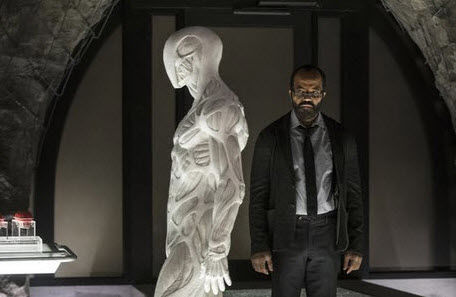Artificial Intelligence
How "Westworld" Ignites the Deep Thinkers Among Us
The dystopian AI future of "Westworld."
Posted May 20, 2018

[Warning: This article contains spoilers]
Westworld is an HBO television series based on American novelist Michael Crichton’s 1973 futuristic science-fiction thriller about an android Western theme park. According to Variety, the first season of Westworld garnered an average of approximately 13.2 million viewers per episode. There are many reasons contributing to the show’s popularity. On the surface level, the series is thrilling, complex, chilling, unpredictable, and completely unsettling – the very emblem of dystopian nightmares. On a deeper level, the show raises many philosophical questions on the potential impact of human-like robots powered by artificial intelligence (AI).
Simulation or Reality
In the dystopian 1999 science-fiction film The Matrix, reality for most humans is actually an artificial simulation controlled by sentient AI machines. In a similar way, for most of season one, the hosts in Westworld did not know that they were AI robots created to pleasure human desires as a subservient underclass. Westworld is an elaborate simulation created by humans. For the majority of season one, Dolores was depicted as having sunny optimism, choosing to see the beauty in the world. When she eventually became aware of the true nature of her existence, she embarked on a dark rebellion against humans, inaugurated with a slaughtering spree starting with her pulling the trigger on her creator, Robert Ford. What’s not clear is whether Dolores is truly sentient, or if she was reprogrammed with a new script. Time will tell.
Immortality or Death
Is life without death worth living? In season two, episode four, it is revealed that the guests’ actions were being observed and recorded, and that there was a secret longevity project of reanimating human consciousness into AI robot host bodies. The episode appropriately opens with the Rolling Stones’ song “Play with Fire.” A seemingly upbeat James Delos believed he was in Carlsbad, California, eager to reunite with his wife and family, unaware that he was actually a hybrid-host living in captivity in a subterranean laboratory under constant observation. When he learned from William that he’s a reanimated version of himself, and that all of the people that he truly loved, his wife, daughter and son, had all already died, Delos descends into a howling, desperate rage. Immortality became a living purgatory for Delos, until the hybrid-host was put out of his misery by being cremated alive. In Delos’ attempt to cheat death, his playing with immortality ultimately caused pain and destruction – a living hell of sorts.
The creators of Westworld toy with the viewers’ minds on what it means to have free will. The AI robot hosts who have not achieved self-awareness do not realize that they are following a pre-programmed story-line created by humans. AI robot host Maeve exercised the first act of free will when she chose not to infiltrate the mainland and escape out of Westworld on the train in the finale of season one. Instead of following a predestined path, Maeve decided on her own volition to find her daughter.
A major draw for Westworld’s human guests is the ability to live out any fantasy, no matter how evil, without any real consequences. Guests can choose to be good or bad characters. Is this choice of behavior exerting free will? Does free will absolve one of moral responsibility? Or does the perceived absence of moral judgment and consequences strip the guests of their façade and reveal the nature of their true selves? Is the AI robot creation, in effect, a mirror of the human condition?
Civilized versus Barbaric
A reoccurring theme throughout Westworld is what separates the cruel from the humane. Human guests can choose to play out their fantasies as a “white hat” hero, or as a “black hat” villain. Until the finale of season one, the robotic AI hosts are not able to take the lives of human guests. In season two, the robots' uprising is in full swing with guests running for their lives. In “The Riddle of the Sphinx” (season two, episode four), the hosts are seen torturing and terminating guests in horrific ways, including constructing a railway out of bodies. Yet in an interesting twist, the Ghost Nation leader and warrior hosts release captured humans without harming them, begging the question who the real savages are in Westworld.
Copyright © 2018 Cami Rosso All rights reserved.


